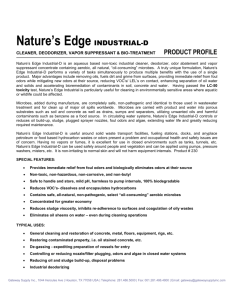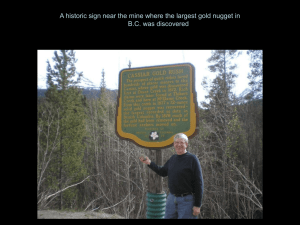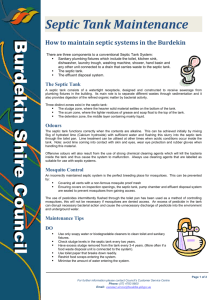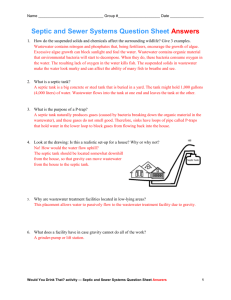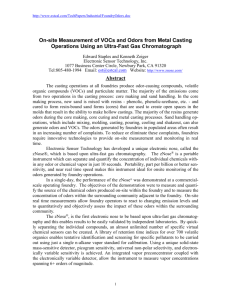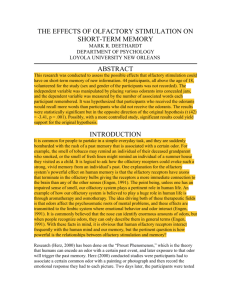Freezing Problems and Septic System
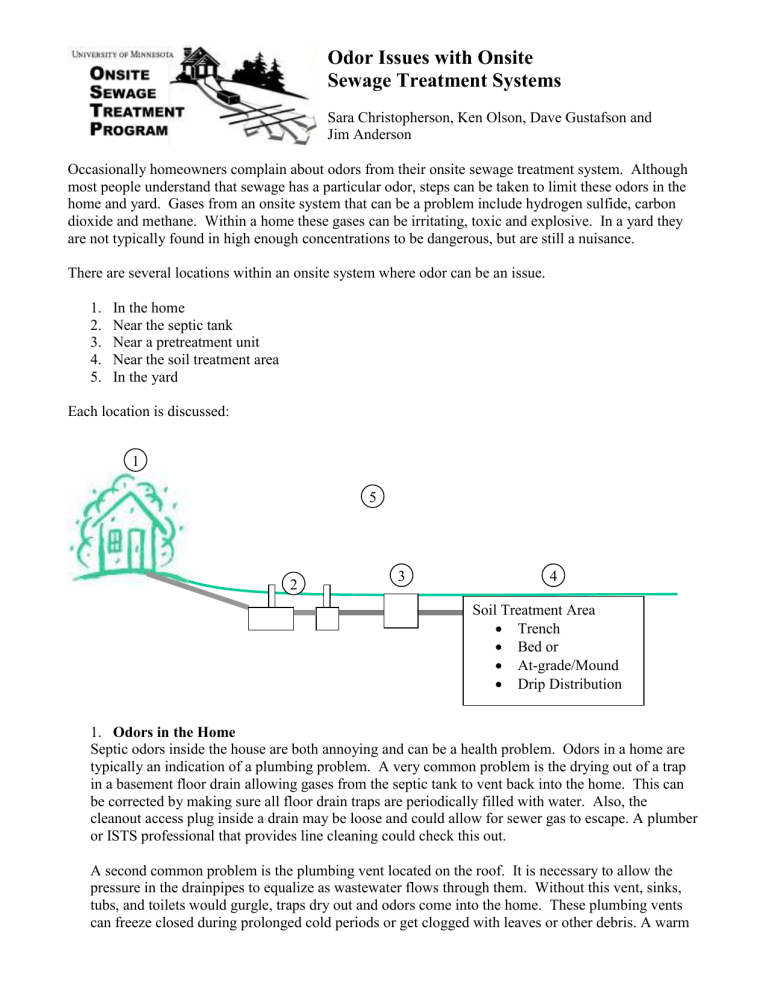
Odor Issues with Onsite
Sewage Treatment Systems
Sara Christopherson, Ken Olson, Dave Gustafson and
Jim Anderson
Occasionally homeowners complain about odors from their onsite sewage treatment system. Although most people understand that sewage has a particular odor, steps can be taken to limit these odors in the home and yard. Gases from an onsite system that can be a problem include hydrogen sulfide, carbon dioxide and methane. Within a home these gases can be irritating, toxic and explosive. In a yard they are not typically found in high enough concentrations to be dangerous, but are still a nuisance.
There are several locations within an onsite system where odor can be an issue.
1.
In the home
2.
Near the septic tank
3.
Near a pretreatment unit
4.
Near the soil treatment area
5.
In the yard
Each location is discussed:
1
5
3 4
2
Soil Treatment Area
Trench
Bed or
At-grade/Mound
Drip Distribution
1.
Odors in the Home
Septic odors inside the house are both annoying and can be a health problem. Odors in a home are typically an indication of a plumbing problem. A very common problem is the drying out of a trap in a basement floor drain allowing gases from the septic tank to vent back into the home. This can be corrected by making sure all floor drain traps are periodically filled with water. Also, the cleanout access plug inside a drain may be loose and could allow for sewer gas to escape. A plumber or ISTS professional that provides line cleaning could check this out.
A second common problem is the plumbing vent located on the roof. It is necessary to allow the pressure in the drainpipes to equalize as wastewater flows through them. Without this vent, sinks, tubs, and toilets would gurgle, traps dry out and odors come into the home. These plumbing vents can freeze closed during prolonged cold periods or get clogged with leaves or other debris. A warm
day or two will thaw out the frozen pipe but leaves will need to be cleaned out. The pipe can be unfroze using a jetter or warm water. Always take special precautions when working on a slippery or steep roof.
A third common plumbing problem is an improperly sealed cover on an ejector sump pump basket in the basement. The cover should be checked and a new seal applied to prevent leaks.
2. Odors near the septic tank
An occasional weak odor near the septic tank may be quite normal but if there is a particularly strong odor around the septic tank(s) the first step should be to make sure all manholes and risers are securely covered. Typically a concrete lid covers the tank manhole, although other materials such as plastic and metal lids are used. The septic tank manhole can be covered with a maximum of 12” of soil or can come to the surface, while any manhole on a tank with a pump must come to surface to allow for repair or replacement of the pump. The newer plastic lids have a rubber seal which helps keep odors in the tank. They must also be properly secured in place with lag screws or other fasteners. If a concrete lid is leaking odors out of the manhole, weather stripping or other materials can be used to create a temporary seal that will contain odors but still allow for proper maintenance of the tank. This seal will need to replaced after maintenance.
3.
Odors near a pretreatment unit
There is a growing use of pretreatment units in onsite sewage treatment systems. The most common pretreatment devices are aerobic treatment units, constructed wetlands and peat, recirculating, sand and textile filters. If an odor is persistent around one of these pretreatment units a licensed onsite professional trained to maintain the specific type of unit should be called.
4. Odors near the soil treatment area
If there are strong odors in the soil treatment area (around an in-ground drain field, bed or mound), it can indicate a problem with that part of the system. All inspection pipes should be checked to make sure the pipes are not broken and they are covered. A visual inspection of the entire area should be performed to determine if there are any wet or spongy soil areas indicating that sewage is coming to the surface. If any of these conditions are found, humans and animals can come in contact with it.
This is considered an “imminent health threat” and should be corrected immediately.
5. Odors in the Yard
If the yard in general smells of septic gas, it may be that the plumbing vent pipe (described in # 1 above) on your house or a neighbor’s house needs to be extended to diffuse the odors. Homes located in valleys, forested areas or low areas may not have appropriate wind patterns to carry the odors away from the living areas and the yard. As the wind blows over the house, the air currents that are supposed to carry the gases up and away can instead carry the sewer gas down into the yard.
Extending the vent pipe can help diffuse the odors carrying them away from the yard. Carbon filters can also be placed on the top of the vent to help control odor. The filters do need to be changed regularly (every 1 to 5 years) to be effective. According to the Minnesota Plumbing Code a device, such as a filter, cannot obstruct the flow of air, therefore the filter must be chosen in accordance with these regulations. Check with the local unit of government if clarification is needed.
For More Information
Please see our website at: http://septic.coafes.umn.edu/homeowner/index.html for more information about proper operation of septic systems. We can be reached by calling 800/ 322-8642.
